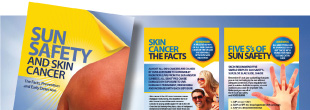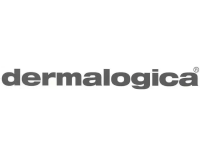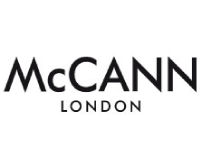
RAISING AWARENESS THROUGH EDUCATION
PROMOTING PREVENTION & EARLY DETECTION CAMPAIGNING FOR CHANGE
SKCIN: THE KAREN CLIFFORD SKIN CANCER CHARITY / REGISTERED CHARITY: 1150048

WE NEED YOUR HELP! PLEASE HELP US TO STOP SKIN CANCER TAKING MORE LIVES. WE ARE HUGELY GRATEFUL FOR YOUR SUPPORT.
Sunscreen - Know Your Facts
Sun Safety & Prevention
Do you know your facts about Sunscreen? Which to buy, what
SPF, UVA protection, how much to apply, when to reapply...

Over 80% of all skin cancers are preventable by following
just 5 simple sun safe measures: Slip, Slop, Slap, Slide, Shade...

A child’s delicate skin can burn within minutes causing
irreparable damage - learn how to protect them...

Did you know that the snow reflects up to 80% of sun
burning UV radiation! Learn about winter sun protection...

Is your child’s school or pre-school Sun Safe?
Make sure children are protected during school hours...

Do you work outdoors? Is your workplace Sun Safe?
Find out more about Sun Safety in the Workplace...
Sunscreen, the facts we should all know:
The active ingredients in sunscreens (called UV filters) are classified as either organic or inorganic.
Organic chemicals work by absorbing UV radiation, whereas inorganic chemicals both absorb and scatter the incident UV radiation. Many modern sunscreens contain a mixture of both organic and inorganic UV filters to provide broad spectrum protection against both UVA and UVB radiation.
The Sun Protection Factor (SPF) is a system used globally to determine how much protection a sunscreen gives when applied to the skin at a thickness of 2mg/cm2. The test measures how much protection against UV radiation the sunscreen provides, e.g. a product providing SPF30 will result in a skin exposure of just one-thirtieth that received by unprotected skin for the same time in the sun.
Sunscreens, in order to be protective, have to be applied liberally to be effective. This includes using it to all exposed areas and regularly reapplying sunscreen every 2 hours and immediately after swimming/towelling.

- Firstly be aware that no sunscreen provides complete protection, so never rely on sunscreen alone to protect your skin - for best protection you should practice all Five S's of Sun Safety.
- Choose a sunscreen with a Sun Protection Factor (SPF) 30 or above, preferably water resistant.
- Make sure it's broad spectrum and carries a UVA symbol (if it has a star rating, use a minimum 4 star).
- Be aware that the price of sunscreen does not always match the quality.
- Store in an accessible, cool place and remember to check the expiry date!
- Try a toddler sunscreen if you have sensitive skin.
- Apply sunscreen 20 minutes before you go outside and preferably once again when outdoors.
- Apply a generous amount of sunscreen. Ideally, the average-sized adult should apply at least a teaspoon of sunscreen to each arm, leg, front of body and back of body and at least ½ a tea spoon to the face (including the ears and neck). That is, 35 ml of sunscreen for one full body application. Many people find this quantity just too much, so one trick is to reapply once you are in the sun. Think of applying sunscreen like painting a wall with a textured surface, when two coats is almost always required for satisfactory coverage. In the same way two "coats of sunscreen" may be required for adequate protection.
- No matter what the sunscreen instructions say, you should reapply sunscreen every two hours when you are outdoors. Sunscreen can be easily wiped or perspired off and you need to keep putting sunscreen on to get the best protection.
- Always reapply sunscreen immediately after swimming / towelling.
A British Skin survey has revealed that over a third of British men and women are unsure of what an SPF is. People are also confused about the difference between UVA and UVB rays, with
three-quarters of those questioned attributing UVA rays to burning and 77% UVB rays to ageing.
To understand more about UV radiation, our skin and sun protection, please click on the diagram below to enlarge >
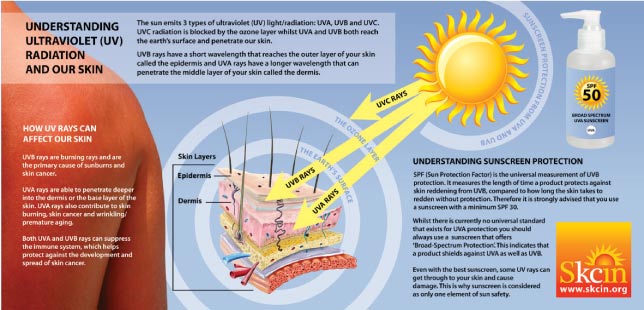
Click here to view the common myths about sunscreen and sunbathing >
You may also be interested in the following related topics:
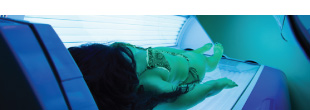
out the truth and misconceptions
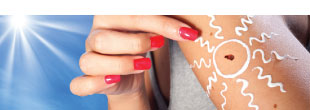
what you should be looking for...
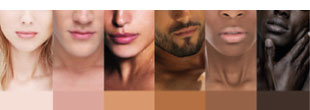
of associated risk and protection...

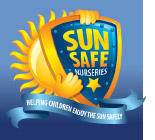
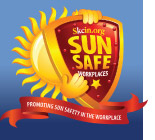
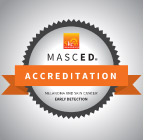
Articles of interest
SIG ROOFING PARTNERS WITH SKCIN
Aptly timed during skin cancer awareness month, National roofing merchant SIG Roofing has announ...
28th May 2024 3:05pm
SKCIN, a charity that specialises in the prevention and early detection of skin cancer through educational interve...
1st May 2024 12:39pm
AHEAD OF NATIONAL SKIN CANCER AWARENESS MONTH IN MAY, BRITISH BEAUTY BACKS VAT BURN CAMPAIGN AMIDST SKIN CANC...
26th Apr 2024 2:16pm
SUNAK WARNED MELANOMA CASES WILL INCREASE WITHOUT GOVERNMENT ACTION
Skcin are proud to support SNP MP Amy Callaghan with her on-going VAT Burn Campaign as she...
28th Nov 2023 12:20pm
SKCIN are delighted to highlight a positive initiative by New College Lanarkshire in Motherwell. The college is supporti...
22nd Jun 2023 1:05pm
